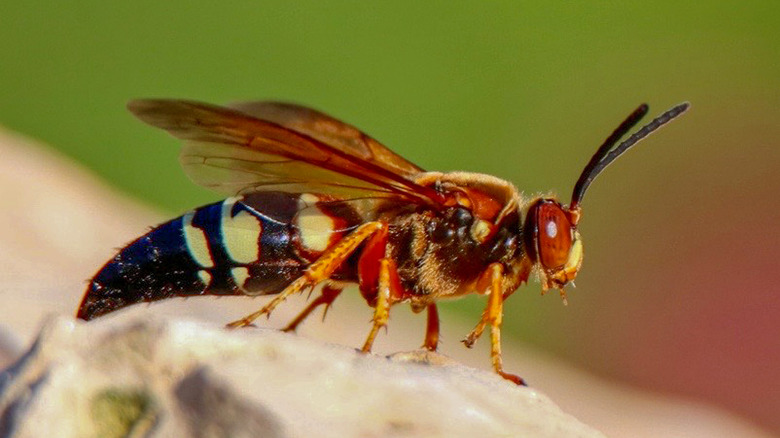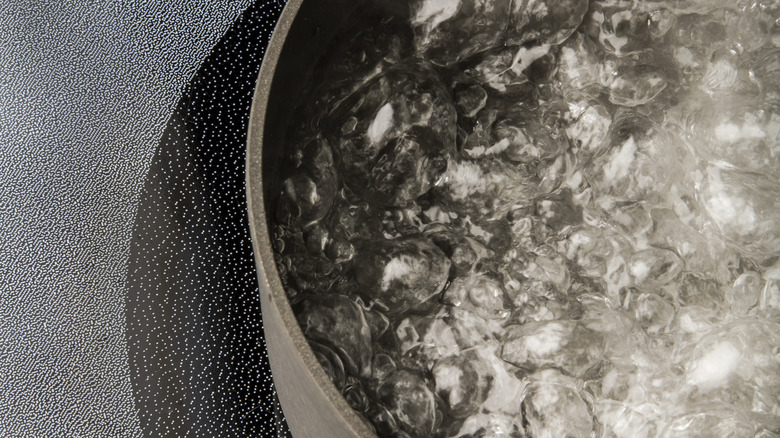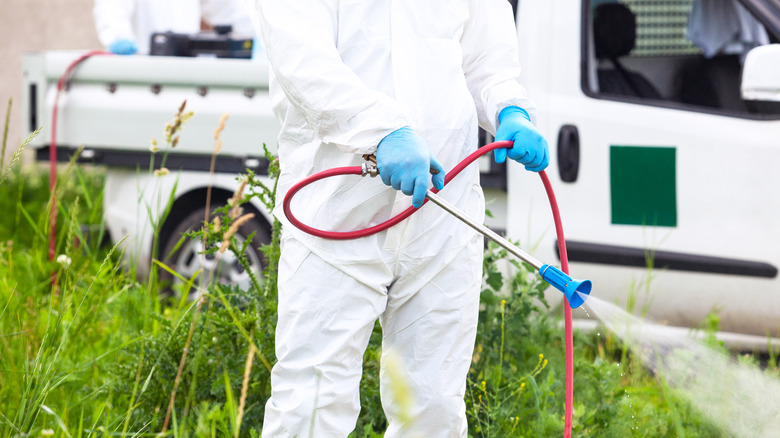Get Rid Of Cicada Killer Wasps With These Simple Solutions
Depending on where you live, the sound of cicadas is about as closely linked to summer as backyard barbecues and splashing around swimming pools. That's because the noisy little buggers make their presence known beginning around July and winding down in September. Depending on the type of cicada, they live for three to four weeks once they've gone aboveground. Although they aren't problematic to people or property the vast majority of the time, there is another breed of insect that most certainly poses a threat to them, the aptly named cicada killer wasp. Fortunately for people with severe wasp phobia, there are a number of pretty solid ways to do away with cicada killers or simply get them to relocate.
The unscientific name "cicada killers" was obviously bequeathed by someone who saw the wasp in terrifying action. Females sting cicadas, thereby injecting them with a painful, paralyzing venom. They then cart them off underground to serve as a hearty meal for hungry larvae. It truly is the stuff of cicada nightmares. It's easy enough to tell them apart from other types of wasps because they are either dark brown or black with bright yellow marks and amber-colored wings. Plus, they're big boys and girls, at around two inches long with a similar wingspan. If this is all just too much for you to handle, but you don't want to turn to the professionals, there are plenty of DIY methods to send cicada killer wasps packing.
The best ways to eliminate cicada killers
Cicada killer nests are pretty obvious. They're hallmarked by a one or two-inch U-shaped hole in the ground in sandy soil. No matter what substance you select to deal with a cicada killer nest, there are some important safety precautions to take. First, never do anything during daytime hours. Wait for night to fall to risk far fewer stings. When you do apply the substance, keep as much distance as possible, and cover up your skin with pants, a hat, and long sleeves.
There are a few options that will get rid of the adult cicada killer wasps, like borax, soapy water, or bleach. A water and vinegar mixture is another option, although it won't kill the insects, but will make the nest so muddy that they will be forced to relocate. Whichever you select, pour the substance in the hole at night for a few consecutive days. This should cut down the adult wasp population by a lot. The key word in that statement, of course, is "adult." These eradication methods won't do much, if any, damage to eggs.
Boiling water is one of the best options for destroying the nest, adults, and eggs included (although some experts disagree on the egg part). Just be careful not to spill it on yourself or someone else because that can cause a nasty burn. After pouring the water, cover each hole with a glass bowl to suffocate any who manage to come aboveground.
Why you might not want to destroy cicada killer nests
All of these methods to eliminate a nest will likely require repetition over a matter of days to hopefully destroy the nest entirely. If you have more than a couple of cicada killer holes, however, it's probably best to leave it to the professionals, who can use products that will fully eradicate the nest, including eggs and larvae.
That said, cicada killers are often just fine where they are. They help control the cicada population, which is ideal for people who actively try to keep cicadas out of the yard. Plus the male wasps don't even have stingers. Although the females do have stingers, they rarely care about humans or pets and are instead fixated on their cicada prey to feed their young.
If the cicada killers are doing damage to your landscaping or just creeping you out completely, however, it's fine to take matters into your own hands or enlist the help of a professional. The desirable sandy/dirt area must be addressed otherwise new wasps will just set up shop there eventually. To keep them out, cover or plug the holes so that they aren't enticing to new residents in years to come.


